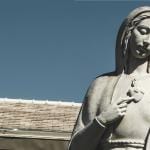
Celestial Occurrence is but one trope featured in manuals instructing ancients how to write about great men and their births, and “Matthew” follows these rules strictly.
Celestial. Astral. Sky Vault. Unfamiliar terms for modern Christians spuriously familiar with the Gospels and Christmas origins. But understood rightly, these are the right terms to unlock much of the New Testament.
Even the earliest of Christmas stories, Matthew 1—2, describes the birth of Jesus and surrounding events filled with celestial or astral or sky vault phenomena. “Matthew” gives a typical ancient Mediterranean account detailing the birth of an ancient Mediterranean VIP. All the proper tropes and modes of description for such an account are employed. So from start to finish, the story of Jesus “Matthew” gives talks about sky vault persons impacting the land of Israel.
“The Angel of the Lord,” perhaps the greatest of the celestial servants of God’s fancy entourage in sky vault, comes down from to the land of Israel. At the bidding of Yahweh, he speaks to the saddiq Joseph in dreams. Both “Matthew” and “Luke” tell of celestial activities and phenomena involved at Jesus’ birth (Matthew 1:20, 24; 2:13, 19; Luke 1:11, 13, 18, 19, 30, 34, 35, 38; 2:9, 10) and resurrection (Matthew 28:2, 5).
Celestial Signs
Biblically speaking, stars and angelic persons are interchangeable. In the Gospel called “Luke,” we read about stars talking to shepherds
Luke 2:13-14
And suddenly there was a multitude of the sky vault host with the angel, praising God and saying:
“Glory to God in the highest and on earth peace to those on whom his favor rests.”
In “Matthew,” when Jesus dies, earthquakes result, caused by sky vault.
Matthew 27:54
The centurion and the men with him who were keeping watch over Jesus feared greatly when they saw the earthquake and all that was happening, and they said, “Truly, this was a Son of God!”
At the resurrection, again an earthquake happens, caused by the sky vault.
Matthew 28:2
And look, there was a great earthquake; for an angel of the Lord descended from sky vault, approached, rolled back the stone, and sat upon it.
The Christmas Star: a Comet
So much nonsense is written about the “star” the Matthean astrologers, popularly imagined as “kings,” followed (see Matthew 2:2-10). Forget all of it except this: what “Matthew” describes is a comet, an invented detail that likely didn’t happen in history. In antiquity, comets were always deemed terrible omens, portents of political upheaval. This moving star, an other-than-human sky person, leads the Babylonian magi toward Bethlehem.
Celestial Honor Recognition of Jesus
Matthew 2:1-12—
When Jesus was born in Bethlehem of Judea, in the days of King Herod—look!—magi from the east arrived in Jerusalem, saying, “Where is the newborn king of the Judeans? We saw his star at its rising and have come to do him homage.”
When King Herod heard this, he was greatly troubled, and all Jerusalem with him.
Assembling all the chief priests and the scribes of the people, he inquired of them where the Messiah was to be born.
They said to him, “In Bethlehem of Judea, for thus it has been written through the prophet:
‘And you, Bethlehem, land of Judah,
are by no means least among the rulers of Judah;
since from you shall come a ruler,
who is to shepherd my people Israel.’”
Then Herod called the magi secretly and ascertained from them the time of the star’s appearance.
He sent them to Bethlehem and said, “Go and search diligently for the child. When you have found him, bring me word, that I too may go and do him homage.”
After their audience with the king they set out.
And look, the star that they had seen at its rising preceded them, until it came and stopped over the place where the child was.
They were overjoyed at seeing the star, and on entering the house they saw the child with Mary his mother.
They prostrated themselves and did him homage.
Then they opened their treasures and offered him gifts of gold, frankincense, and myrrh.
And having been warned in a dream not to return to Herod, they departed for their country by another way.
How to Write the Origins of a Great One
What is going on here? It is standard procedure for writing about an ancient Mediterranean great one. We know about the progymnasmata, Greco-Roman writing manuals. These proliferated in the ancient world. Without them, “Matthew” and “Luke” would not exist. Through their exercises in rhetoric, the progymnasmata instructed students organizational techniques, a “how-to” about praising a famous person around various topics. Context Scholars Bruce Malina and Richard Rohbaugh find it amazing how closely the Matthean Infancy Narrative follows these schoolboy rhetoric manuals.
The Context Scholars cite an example in Hermogenes of Tarsus (ca. 180 CE). He taught his disciples: start with the origin and birth of the subject. Talk of his “people, as the Greek, a city, as Athens, a family as the Alcmaeonidae.” That is exactly what “Matthew” does with his manufactured genealogy, says John Pilch, Rohrbaugh, and Malina.
“Matthew” is a good follower of the wisdom of Hermogenes who says that the next step is to list and describe “what marvelous things befell at birth, as dreams or signs or the like.” Indeed, “Matthew” lists dreams (Matthew 1:20; 2:12, 13, 19), celestial phenomena (2:2, 10), apparitions of angels (1:20), and the honor given by astrologers bearing special gifts (2:1,11).
Pilch notes that Quintilian (d. 100 CE) instructs his rhetorical students to make note of events that transpired before the birth of the VIP, including prophecies speaking about the subject’s “coming greatness” (Inst. Orat. 3.7.10-18). “Matthew” agrees and gives these also (1:23; 2:6)!
Celestial Honor
Celestial events speak about the great one born on earth. Again the “star” moving westward from the East (v. 9) is a comet, says the Context Scholars. All comets were thought to be terrifying omens speaking of political turmoil and change. But what exactly do they mean? That depends on their direction, says Pliny the Elder.
“Sometimes there is a comet in the western sky, usually a terrifying star and not easily explained,” Pliny says. Pliny next explains different political calamities that each type of “star” ( = comet) signifies (Natural History 2, 23). Any comet would expectedly trouble Herod and all Jerusalem. That the magi come to “the king of the Judeans” illustrates that Jesus’ birth has a political impact.
Judean, not Jew
Two posts ago I indicated that everywhere “Jews” is found in our English Bible translations, it is wrong. It should always, always read “Judeans,” never “Jews.” So too in Matthew 2:12 where again English readers find “Jews”—even in our very best English translations—is likewise incorrect. It should read “Judeans.” The Greek used here (and always throughout “Matthew”) is Ioudaios, and there is no other meaning it has but “Judean.” The way “Matthew” uses it, Ioudaios refers only to someone (or something) from Judea. It correlates to “Galilean” and “Perean,” and all three terms refer to Israelites living in Syro-Palestine.
Here we discover the name for the ethnic group involved in this Gospel called “Matthew”—“Israel.” Note that Joseph gets directed to back to the land of Israel (not “Judea” and not “land of the Jews,” 2:20-21). Note that the Matthean Jesus only refers to his people as “Israel” (Matthew 8:10; 9:32-33; 19:28).
Matthean Twist
The progymnasmata of Menander Rhetor (late 3rd century) teaches writers that they must praise the polis from which their honored subject originates. Pilch explains that this is because honor is ascribed to those born in an honorable polis (Treatise 2.369.17 — 370.10).
But in order to do this, “Matthew” has to spin and twist some Scriptural citations into pretzels. So he quotes the prophet Micah when he mentions Bethlehem, but twists the prophet’s meaning 180 degrees.
Micah 5:1
But you, Bethlehem-Ephrathah
least among the clans of Judah,
From you shall come forth for me
one who is to be ruler in Israel;
Whose origin is from of old,
from ancient times.
See how Micah called Bethlehem “one of the little clans of Judah” (5:1)? Look how “Matthew” reshapes that—
Matthew 2:6
And you, Bethlehem, in the land of Judah,
are by no means least among the rulers of Judah;
for from you shall come a ruler
who will govern my people Israel.
Synoptic Embarrassment
“Matthew” and “Luke” both depend on the earlier Gospel called “Mark” to write of Jesus. “Mark” has no Infancy Narrative, no Bethlehem is needed. Nazareth is all you get for Jesus’ meager place of origin. “Matthew” and “Luke” were both embarrassed of the Galilean Jesus’ roots in the hamlet Nazareth. Even Bethlehem isn’t much, except for its Davidic ties. So “Matthew” writes about the origins of Jesus who hails from the royal polis, with royal heritage and ancestry, who is meant to be king over Israel. Pilch and friends explain that the Matthean Jesus traverses the entire social spectrum from the village artisan belonging to “Mark.”
More on those magi, as promised, later.












